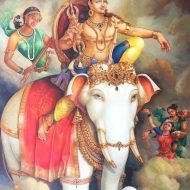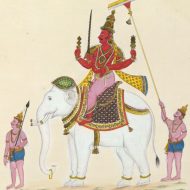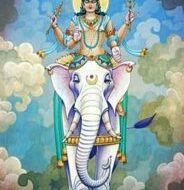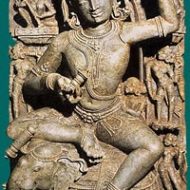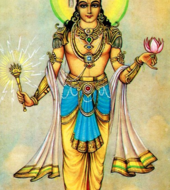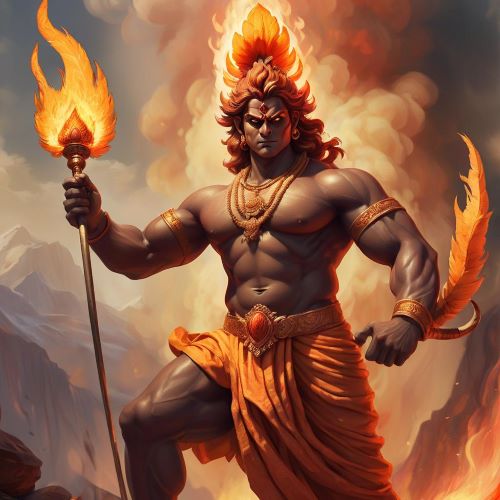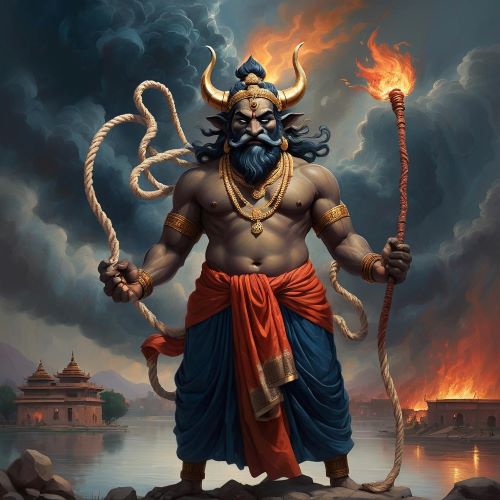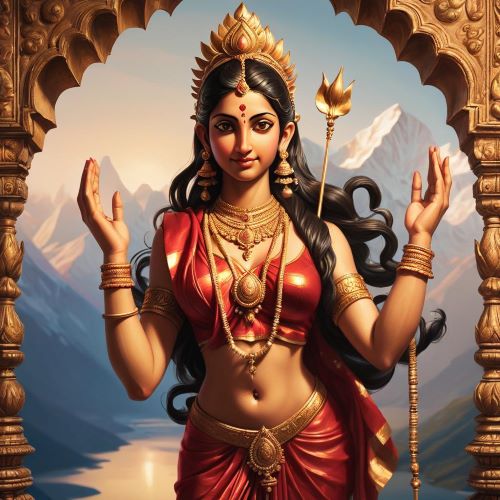Indra : King of Devas
Listen
At a glance
| Description | |
|---|---|
| Origin | Indian Mythology |
| Classification | Gods |
| Family Members | Dyavus (Father), Prithvi (Mother), Adityas (Siblings), Shachi (Wife), Jayanta, Rishabha, Midhusha, Jayanti, Devasena, Vali and Arjuna (Children) |
| Region | India, Indonesia, Thailand, Vietnam, Cambodia |
| Associated With | Heavens, Thunder, Rain |
Indra
Introduction
Indra, holds the esteemed position of being the ruler of gods, known as devas, and the heavenly realm, Svarga, in Hinduism. He is closely connected with various natural phenomena, including the sky, lightning, weather, thunder, storms, rainfall, river currents, and warfare. These attributes link him to similar deities found in other Indo-European cultures like Jupiter, Perun, Perkūnas, Zalmoxis, Taranis, Zeus, and Thor, all of whom are part of the broader Proto-Indo-European mythological tradition.
Indra’s significance is paramount in the Rigveda, making him the most frequently mentioned deity. He is celebrated for his divine authority, symbolizing order, and is renowned for vanquishing the formidable malevolent asura known as Vritra. This triumph over Vritra removed the obstacle to human prosperity and happiness, solidifying Indra’s status as a benevolent force in the Hindu pantheon.
Physical Traits
In the Rigveda, Indra is depicted as resolute, wielding a thunderbolt while riding a chariot. The Vajra, or thunderbolt, served as Indra’s weapon in his triumph over the malevolent Vritra. Additionally, alternative representations of him include a bow (sometimes in the form of a vibrant rainbow), a sword, a net, a noose, a hook, or a conch. Indra’s thunderbolt is referred to as Bhaudhara.
In the post-Vedic era, he is often portrayed riding a grand, four-tusked white elephant named Airavata. In sculptures and relief artworks found in temples, he is commonly depicted either seated upon an elephant or in close proximity to one. In instances where he is shown with two elephants, he holds both the Vajra and a bow.
Family
Indra, a prominent deity in Hinduism, holds the esteemed position of being the king of the gods and the master of thunder, lightning, rain, and warfare. His familial connections are described in various sources: his parents are either Vedic Dyaus (father) and Prithvi (mother) or Puranic Kashyapa (father) and Aditi (mother). He has siblings known as the Adityas, which include Surya, Varuna, Bhaga, Aaryaman, Mitra, Savitra, and Vamana. His consort is Shachi (also known as Indrani) or Aruni, and he has offspring named Jayanta, Rishabha, Midhusha, Jayanti, Devasena (Shashthi), Vali, and Arjuna (considered his spiritual son).
Indra, renowned for his intense desire, frequently engaged in unfaithful acts towards his wife. On multiple occasions, he cunningly concealed his identity to seduce his unsuspecting targets. One infamous object of his seemingly insatiable lust was the wife of the sage Gautama. However, Indra’s amorous escapades occasionally exacted a heavy toll. In one instance, an enraged husband inflicted such severe injuries on him that the gods struggled to reconstruct his shattered form. When they eventually succeeded, they discovered a crucial part missing and were compelled to complete the god’s restoration using a ram’s member.
Other names
Indra is a Hindu deity who has many names and epithets that reflect his attributes and functions. He is called Devendra, meaning “lord of the gods” or “king of the devas”, Mahendra, meaning “the great Indra” or “the great god”, and Surendra, meaning “chief of the gods” or “best of the gods”. He is also known as Surapati, meaning “lord of the suras” or “lord of the celestial beings”, Suresha, meaning “ruler of the gods” or “lord of the good ones”, Devesha, meaning “lord of the devas” or “lord of the divine ones”, and Devaraja, meaning “king of the devas” or “king of the divine ones”. He is also called Amaresh, meaning “immortal lord” or “lord of the nectar”, as he drinks the soma juice that grants him vitality and power. He is also associated with rain and thunder, and hence he is named Parjanya, meaning “the rain-god” or “the thunderer”. His most distinctive feature is his weapon, the vajra, which is a thunderbolt that can strike down his enemies. He is therefore called Vajrabhrit, meaning “bearing the vajra” or “wielder of the vajra”, Vajrin, meaning “armed with the vajra” or “having the vajra as a weapon”, Vajrajit, meaning “conqueror with the vajra” or “victorious with the vajra”, and Vajrapani, meaning “holding the vajra in his hand” or “having the vajra as his attribute”.
Powers and Abilities
In early religious texts, Indra assumes various roles. As king, he leads expeditions to seize cattle from the dasas, or dasyus, the original inhabitants of the lands his people roam. He wields the power of rain as the god of thunder, and he stands as the formidable warrior who vanquishes the anti-gods (asuras). His most renowned victory is over the dragon Vritra, a leader of the dasas and a malevolent force associated with drought. Vritra is accused of hoarding waters and rains, stealing cows as a dasa, and concealing the Sun as an anti-god. Indra’s potency for these feats is enhanced by imbibing the elixir of immortality, the soma, offered to him by priests during rituals. Among his allies are the Rudras (or Maruts), who ride the clouds and command storms. Indra is sometimes referred to as “the thousand-eyed.”
In later Hinduism, Indra is no longer venerated but retains vital mythological roles as the god of rain, ruler of the heavens, and guardian of the east. Subsequent texts acknowledge a hiatus in the worship of Indra. In the Mahabharata, Indra begets the great hero Arjuna and endeavors in vain to thwart the god of fire, Agni, from consuming a vast forest. In the Puranas, ancient compilations of Hindu myths and legends, Krishna, an incarnation of Vishnu, persuades the cowherds of Gokula (or Vraja, modern Gokul) to cease their worship of Indra. Enraged, Indra releases torrents of rain, but Krishna effortlessly lifts Mount Govardhana on his fingertip, providing refuge for the people beneath it for seven days until Indra relents and pays homage.
Modern Day Influence
Indra, known as Sakra in Buddhism, holds sway over the realm of the 33 gods. In Cambodian lore, he is celebrated as Pah En, the deity of the sky, and stands as the most revered among all gods. It is believed that he resides atop Mt. Meru or Prah Sumer, accompanied by his attendants, the Yeaks (Yashas), formidable ogres distinguished by their fangs and red eyes, with the power to shape-shift at will. In the Cham religious tradition of Vietnam, Indra assumes the role of the god of thunder and is often depicted riding a white elephant. In Chinese customs, he is equated with the deity Ti-shi. Furthermore, the worship of this god endures in the present day in the Rajasthan region of India through the Inder Puja festival, which seeks to invoke rainfall to counter the frequent droughts that afflict this desert state.
Related Images
Frequently Asked Questions
What is lorem Ipsum?
I am text block. Click edit button to change this text. Lorem ipsum dolor sit amet, consectetur adipiscing elit. Ut elit tellus, luctus nec ullamcorper mattis, pulvinar dapibus leo.
What is lorem Ipsum?
I am text block. Click edit button to change this text. Lorem ipsum dolor sit amet, consectetur adipiscing elit. Ut elit tellus, luctus nec ullamcorper mattis, pulvinar dapibus leo.
What is lorem Ipsum?
I am text block. Click edit button to change this text. Lorem ipsum dolor sit amet, consectetur adipiscing elit. Ut elit tellus, luctus nec ullamcorper mattis, pulvinar dapibus leo.
What is lorem Ipsum?
I am text block. Click edit button to change this text. Lorem ipsum dolor sit amet, consectetur adipiscing elit. Ut elit tellus, luctus nec ullamcorper mattis, pulvinar dapibus leo.
What is lorem Ipsum?
I am text block. Click edit button to change this text. Lorem ipsum dolor sit amet, consectetur adipiscing elit. Ut elit tellus, luctus nec ullamcorper mattis, pulvinar dapibus leo.

